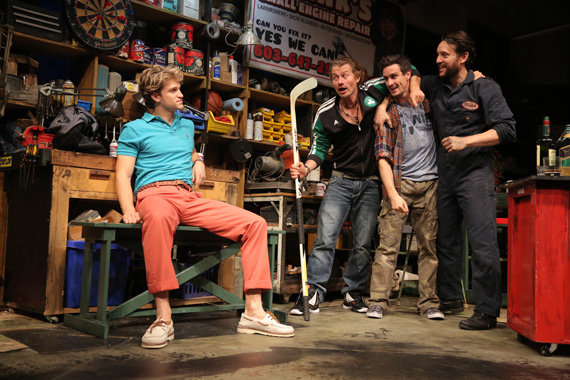Small Engine Repair

(© Joam Marcus)
At first glance, John Pollono’s Small Engine Repair resembles the exposition scenes of an uncommonly-well-acted gay porn film meant to satisfy a working-class fetish. Scruffy handsome men (one in plaid, one in athletic gear, one in a workman’s jumpsuit) stomp around a garage swearing and swilling beer, frequently discussing the size of one man’s penis. But looks can be deceiving. This new play, now receiving its New York debut in a production by MCC at the Lucille Lortel Theatre, is whip-smart and brutally funny. You’re likely to experience a whirlwind of emotions in this Rottweiler of a play that refuses to let go of your imagination long after you’ve left the theater.
Frank (author Pollono) has invited his best high-school buds, Packie (James Ransone) and Swaino (James Badge Dale), over to his small engine-repair shop in Manchester, Hew Hampshire, which these three hardened New Englanders affectionately refer to as “Manch-Vegas.” They’re ostensibly there to drink scotch, smoke pot, and reminisce about the old days. All three are pushing 40 and don’t hang out nearly as much as they once did. Frank is constantly working so he can afford college for his daughter Crystal (something he never got to do); Swaino is preoccupied with bedding girls much younger than he. Packie is too busy Facebooking and being unemployed.
Middle-aged losers past their prime talking about their glory days: I’ve seen this all before, you may scoff. But you’d be wrong. This trip down memory lane takes an unexpected turn with the arrival of Chad (Keegan Allen of TV’s Pretty Little Liars), a preppy 19-year-old Northeastern University student and part-time drug dealer. He thinks he’s there to sell the guys ecstasy, but Frank has very different plans for this evening.
What starts out as your run-of-the-mill cocktail of nostalgia and crushed dreams turns into a dark thriller that cuts open conventional wisdom surrounding class, sex, and justice and exposes the rot living underneath. “People like you never win,” Chad spits at the older, poorer men in the room. While he is a star basketball player at an elite university (tuition and lifestyle financed by his rich Boston lawyer father), the other guys are all high school graduates with dim prospects. As Chad, Allen is perfectly vile, eliciting a violent hatred from the audience in a way few actors can.
Meanwhile, Frank shoots accusations at Swaino like, “You create this hostile environment for women to get treated like meat,” sounding more like a radical feminist than a mechanic (can’t one be both?). Pollono’s play lashes out at a misogynist culture that expects girls to be responsible and modest, but then insists that “boys will be boys.” He ties this double standard to another: Working-class Americans are expected to be responsible (“Get a better job!” “Live within your means!”), while wealthier Americans who screw up are always afforded a bailout. Pollono captures the boiling frustration amid the downwardly mobile and increasingly helpless and scalds you.
Lest we get too bogged down in lofty ideas, director Jo Bonney never allows us to forget that this is a play about real people, steering the ensemble to performances that are nuanced and layered. Set designer Richard Hoover litters the shop with Weedwackers and lawn mowers, suggesting a healthy business for Frank. The shelves are chock-full of supplies and storage boxes, the accumulated material of 15 years of hard work and sacrifice by this single dad and small-business owner. An adorable six-year-old girl holding a wrench smiles at us from a sign above the set reading “Frank’s Small Engine Repair. Can you fix it? Yes we can!” This is Frank’s daughter, who is conspicuously absent from the proceedings yet never really leaves the room.
Pollono packs a lot of punch into just 70 minutes. Audiences will likely take much longer to process what just happened. Elation at just-desserts served, outrage at persistent cruelty, and arousal at the vaguely erotic premise of it all: Your emotions are liable to run the gamut as you leave the theater. Those in the latter group can be thankful that the Lortel exits onto Christopher Street.











